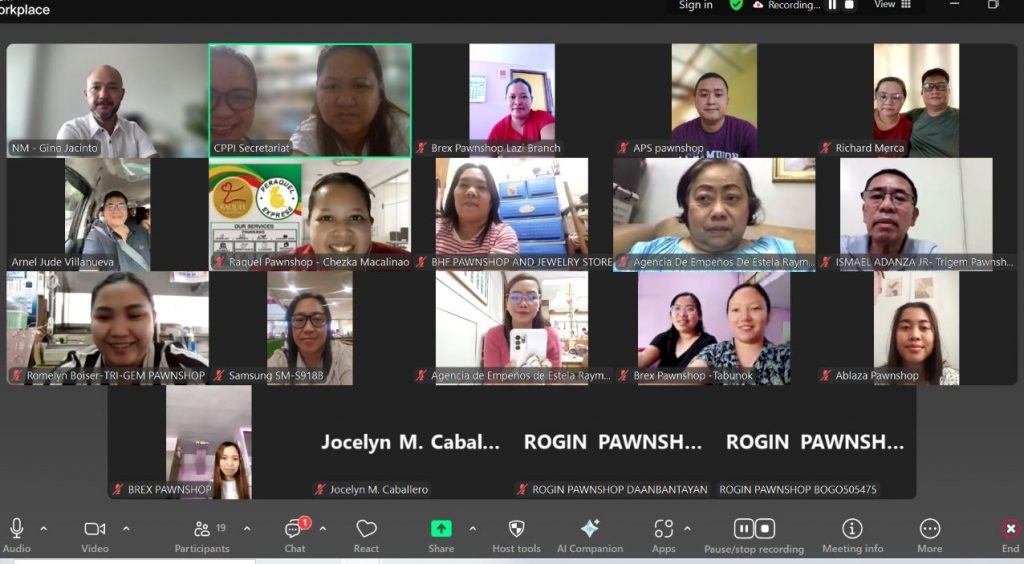
I found myself speaking to two very different audiences—but with one unifying message: legal readiness drives business resilience. In the morning, I addressed early-stage founders at StartUp Village’s “The Gift” incubation program, where we unpacked the legal foundations every startup must secure to operate with confidence. That afternoon, I joined the Chamber of Pawnbrokers of the Philippines, Inc. (CPPI) for a town hall focused on a different kind of compliance: strengthening real-time customer due diligence through proper sanctions, PEP, and watchlist screening.
These back-to-back sessions took place on Saturday, July 26, 2025—a full day that underscored how compliance, whether for scaling startups or regulated institutions, is never just paperwork. It’s structure, defense, and momentum.
What tied both sessions together was a common theme: compliance is not red tape—it’s readiness. Whether you’re forming your first legal entity or preparing for an AMLC audit, your ability to understand and meet regulatory requirements defines how far and how fast you can grow.
In the morning session at StartUp Village’s “The Gift” program, I walked founders through the essentials of government compliance—what I often refer to as legal hygiene for startups.
We began with entity registration: the DTI for sole proprietorships, and the SEC for corporations and OPCs. The choice shapes everything from liability to funding readiness. I shared a case where poor structuring delayed a startup’s seed round by half a year.
From there, we covered local permits, BIR registration, and employment obligations. Even home-based tech startups need barangay and mayor’s permits. BIR registration must be done within 30 days, and filing is required whether or not you’ve made revenue. Hiring even one employee triggers employer duties under SSS, PhilHealth, Pag-IBIG, and eventually DOLE, once the team grows.
We also tackled data privacy compliance under RA 10173—a common blind spot among digital startups. If you’re collecting any personal data, even as part of merchant onboarding or e-learning platforms, privacy notices, consent forms, and basic data protection must be in place.
Licensing requirements vary by industry, but I emphasized the importance of researching regulators such as the FDA, BSP, and IPOPHL, especially when handling products, payments, or intellectual property.
The session closed with a reminder that clear founder agreements, equity allocation, and IP assignment should never be deferred. Legal clarity builds investor confidence.
To help teams execute all of this, I introduced UNAWA’s digital tools:
My message to founders was simple: start legally so that you can scale strategically.
In the afternoon, I joined CPPI’s town hall to speak about a different kind of compliance—anti-money laundering (AML) obligations for pawnshops.
We opened with the basics of RA 9160, the Anti-Money Laundering Act. As Covered Persons, pawnshops must:

But as many operators know, the real difficulty lies in the execution. Manual logs, scattered ID checks, and inconsistent flagging of suspicious activity make compliance fragile and audit preparation a stressful process.
I highlighted recent AMLC enforcement trends and reminded the audience that a single weak point—like missing audit trails—can trigger penalties. The cost of prevention is often far less than the cost of a penalty or reputational loss.
We then walked through UCheck, our platform built for real-time risk screening:
I shared a live use case: a customer walks in, staff runs a name through UCheck, and within seconds, the platform screens against updated lists, log the result, and issues an alert if needed. This replaces manual logs, closes audit gaps, and ensures your team follows a consistent, defensible process every time.
To close, I invited CPPI members to take advantage of UCheck’s pilot program—not just a demo, but a working introduction to digital risk screening. Depending on your needs, the pilot may include:
The goal is to help participating pawnshops explore how real-time screening can fit into their daily operations—and how it can ease the burden of AMLC audits down the line.
The legal requirements of a pre-revenue tech startup and a licensed pawnshop may differ, but the strategic role of compliance remains constant. It’s about protecting your ability to operate, scale, and compete—whether you’re trying to close a funding round or survive an AMLC audit.
At UNAWA, we design legal tools that speak the language of Filipino businesses—from sole proprietors to regulated institutions. These sessions affirmed the urgent need to make compliance accessible, contextual, and embedded into everyday workflows.
We don’t need to fear regulation. We just need to be ready for it.